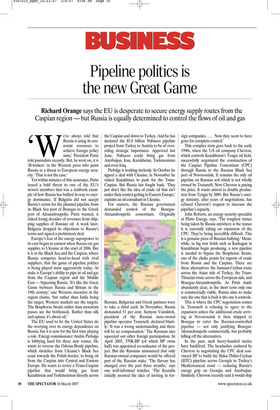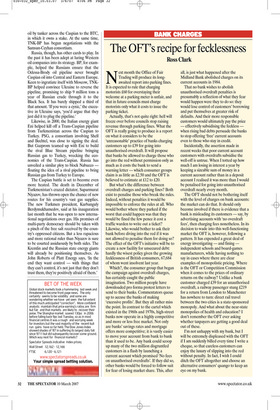Pipeline politics is the new Great Game
Richard Orange says the EU is desperate to secure energy supply routes from the Caspian region — but Russia is equally determined to control the flows of oil and gas ‘We’re always told that Russia is using its economic resources to achieve foreign policy aims,’ President Putin told journalists recently. But, he went on, it is ‘ill-wishers’ in the Western press who paint Russia as a threat to European energy security. ‘That is not the case.’ Yet within minutes of this assurance, Putin issued a bald threat to one of the EU’s newest members that was a textbook example of how Russia has bullied its way to energy dominance. If Bulgaria did not accept Russia’s terms for the planned pipeline from its Black Sea port of Bourgas to the Greek port of Alexandroupolis, Putin warned, it risked losing decades of revenues from shipping supplies of Russian oil. A week later, Bulgaria dropped its objections to Russia’s terms and signed a preliminary deal.
Europe’s fear of the energy superpower to its east began in earnest when Russia cut gas supplies to Ukraine at the start of 2006. But it is in the Black Sea and the Caspian, where Russia competes head-to-head with rival suppliers, that the game of pipeline politics is being played most aggressively today. At stake is Europe’s ability to pipe in oil and gas from the Caspian region and the Middle East — bypassing Russia. ‘It’s like the Great Game between Russia and Britain in the 19th century,’ one Western executive in the region claims, ‘but rather than India being the target, Western markets are the targets. The Bosphorus Straits rather than mountain passes are the bottleneck. Rather than silk and opium, it’s about oil.’ The EU used to let the United States do the worrying over its energy dependence on Russia, but it is now for the first time playing a role. Energy commissioner Andris Piebalgs is lobbying hard for three new routes. He wants to reverse the Odessa-Brody pipeline, which stretches from Ukraine’s Black Sea coast towards the Polish border, to bring oil from the Caspian into Central and Eastern Europe. He wants to revive a Trans-Caspian pipeline that would bring gas from Kazakhstan and Turkmenistan directly across the Caspian and down to Turkey. And he has declared the $5.8 billion Nabucco pipeline project from Turkey to Austria to be of overriding strategic importance. Approved last June, Nabucco could bring gas from Azerbaijan, Iran, Kazakhstan, Turkmenistan and even Iraq.
Piebalgs is working tirelessly. In October he signed a deal with Ukraine; in November he visited Kazakhstan to push for the TransCaspian. But Russia has fought back. ‘They just don’t like the idea of crude oil that isn’t under their control getting to Eastern Europe,’ explains an oil consultant in Ukraine.
For starters, the Russian government demanded control of the BourgasAlexandroupolis consortium. Originally Russian, Bulgarian and Greek partners were to take a third each. In November, Russia demanded 51 per cent. Semyon Vainshtok, president of the Russian state-owned pipeline operator Transneft, declared bluntly: ‘It was a wrong understanding and there will be no compensation.’ The Russians also squeezed out other foreign participation. In April 2005, TNK-BP (of which BP owns half) was appointed co-ordinator of the project. But the Russians announced that only Russian-owned companies would be offered part of the Russian stake. ‘The flavour has changed over the past three months,’ says one well-informed watcher. ‘The Kremlin initially mooted the idea of inviting in for eign companies.... Now they seem to have gone for complete control.’ This complex story goes back to the early 1990s, when the US oil company Chevron, which controls Kazakhstan’s Tengiz oil field, successfully negotiated the construction of the Caspian Pipeline Consortium (CPC) through Russia to the Russian Black Sea port of Novorossiisk. It remains the only oil pipeline on Russian soil which is not wholly owned by Transneft. Now Chevron is paying the price. It wants almost to double production from Tengiz by 2009. But Russia’s energy ministry, after years of negotiations, has refused Chevron’s request to increase the pipeline’s capacity.
John Roberts, an energy security specialist at Platts Energy, says, ‘The toughest stance being taken by Russia anywhere is the stance it is currently taking on expansion of the CPC. They’re being incredibly difficult. This is a genuine piece of Russian bullying.’ Meanwhile, as big new fields such as Kashagan in Kazakhstan begin producing, a new pipeline is needed to bypass the Bosphorus Straits, one of the choke points for exports of crude from Russia and the Caspian. There are three alternatives: the Samsun-Ceyhan route across the Asian side of Turkey, the TransThracian route across the European side, and Bourgas-Alexandroupolis. As Putin made abundantly clear, in the short term only one is commercially viable. Russia aims to make sure the one that is built is the one it controls.
This is where the CPC negotiation comes in. Transneft is refusing to agree to the expansion unless the additional crude arriving at Novorossiisk is then shipped to Bourgas to enter the Russian-controlled pipeline — not only justifying BourgasAlexandroupolis commercially, but probably killing off the alternatives.
In the past, such heavy-handed tactics have backfired. The headaches endured by Chevron in negotiating the CPC deal convinced BP to build the Baku-Tbilisi-Ceyhan (BTC) pipeline across Georgia to Turkey’s Mediterranean coast — reducing Russia’s energy grip on Georgia and Azerbaijan. Similarly, Chevron recently said it would ship oil by tanker across the Caspian to the BTC, in which it owns a stake. At the same time, TNK-BP has begun negotiations with the Samsun-Ceyhan consortium.
Russia, though, has other cards to play. In the past it has been adept at luring Western oil companies into its strategy. BP, for example, helped the Russians ensure that the Odessa-Brody oil pipeline never brought Caspian oil into Central and Eastern Europe. Keen to ingratiate itself with Moscow, TNKBP helped convince Ukraine to reverse the pipeline, promising to ship 9 million tons a year of Russian crude through it to the Black Sea. It has barely shipped a third of that amount. ‘If you were a cynic,’ the executive in Ukraine says, ‘you’d argue that they just did it to plug the pipeline.’ Likewise, in 2000, the Italian energy giant Eni helped kill off a Trans-Caspian pipeline from Turkmenistan across the Caspian to Turkey. PSG, a consortium involving Shell and Bechtel, was close to signing the deal. But Gazprom teamed up with Eni to build the rival Blue Stream pipeline bringing Russian gas to Turkey, wrecking the economics of the Trans-Caspian. Russia has unveiled a similar ploy to block Nabucco floating the idea of a rival pipeline to bring Russian gas from Turkey to Europe.
The Caspian battle is set to become even more heated. The death in December of Turkmenistan’s crazed dictator, Saparmurat Niyazov, has thrown open the chance of new routes for his country’s vast gas supplies. The new Turkmen president, Kurbanguly Berdymukhamedov, said at his inauguration last month that he was open to new international negotiations over gas. His promises of multi-party democracy should be taken with a pinch of the free salt received by the country’s oppressed citizens. But a less rapacious and more rational ruler than Niyazov is sure to be courted assiduously by both sides. The Kremlin and the Russian state energy giants will already be positioning themselves. As John Roberts of Platt Energy says, ‘In the end they want control — with things that they can’t control, it’s not just that they don’t trust them, they’re positively afraid of them.’



























































































 Previous page
Previous page